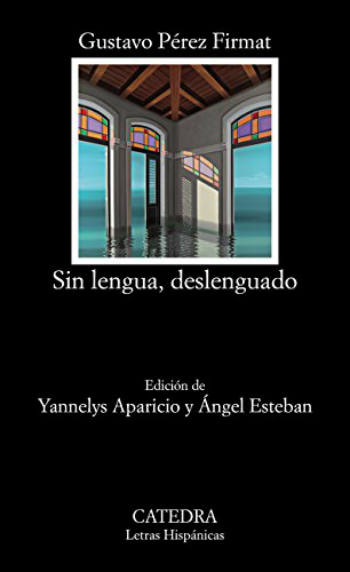Sin lengua, deslenguado. Gustavo Pérez Firmat. Madrid: Cátedra. 2017. 292 pages.
 The bilingual writer’s condition, which Gustavo Pérez Firmat characterizes as that of someone who navigates between two opposing linguistic-cultural identities, constantly appears in this poetic anthology. We could summarize this state with the title of one of his fundamental books: Life on the Hyphen. Born in Cuba in 1949 but exiled with his family to the United States when he was still a child, Pérez Firmat expresses this duality in his poetry with a delight for Spanish and English alternating or mixing incursions into Spanglish with wit and humor, but also with nostalgia and a not-always secretive tear. His poems, moreover, are presented in a bilingual format (some were initially written in Spanish, others in English). It’s poetry that moves in the linguistic and existential instability of someone who has taken root in a foreign country but longs for a country he can’t return to and whose mother tongue is now less dominant than his second language.
The bilingual writer’s condition, which Gustavo Pérez Firmat characterizes as that of someone who navigates between two opposing linguistic-cultural identities, constantly appears in this poetic anthology. We could summarize this state with the title of one of his fundamental books: Life on the Hyphen. Born in Cuba in 1949 but exiled with his family to the United States when he was still a child, Pérez Firmat expresses this duality in his poetry with a delight for Spanish and English alternating or mixing incursions into Spanglish with wit and humor, but also with nostalgia and a not-always secretive tear. His poems, moreover, are presented in a bilingual format (some were initially written in Spanish, others in English). It’s poetry that moves in the linguistic and existential instability of someone who has taken root in a foreign country but longs for a country he can’t return to and whose mother tongue is now less dominant than his second language.
Establishing writing from these opposite coordinates signifies deploying a permanent contradiction and Pérez Firmat is conscious at every moment of this dilemma. “I’m a stew of contradictions,” he writes in Bilingual Blues, one of his poetry books. In it, he uses the Cuban dish as a symbol of a cultural hybrid receptive of diverse influences, festive even. He seasons this tropical flavor with the Anglo-American “blues” that defines the other part of his identity—that of a speaker of an English. Most of his books are written with the modesty of someone who feels insecure in Spanish and also needs to express his Cubanness.
Without completely rejecting this mark of melancholy, he doesn’t renounce the disappointment any discourse of heroism, sacrifice, or nationalism entails, and exile is inseparable from this discourse, as he warns in “To live without history”: “But so much tragedy bores me: (…) So much exile, so much suffering.” The fatigued tone doesn’t exclude a certain determination at the end: “Listen, men of Bayamo: (…) I have a secret to confide: / To live without history is to live.” The ironic counterpoint is addressed to “The Bayamo Song,” the Cuban national anthem, which declares, “To die for the homeland is to live.” Pérez Firmat aims to spare the exile all guilt and fanatical nationalism.
Pérez Firmat almost always qualifies his poetry’s Cuban context with humor or ironic rebuff that is also melancholic. His prose text (poem?) “Nilingüe” is representative of this strategy. The title refers to the “Miamian slang” which, in contrast to the “bilingual” subject, speaks of the “nilingüe” subject who dominates neither one language nor another, namely a certain type of Cuban (and even of many Latinos) in the U.S. The example he evokes comes from popular culture: Ricky Ricardo. This character on the television show I Love Lucy spoke a “pidgin English” that competed with his “defective Spanish.” But the same thing happened to the actor who portrayed him: Desi Arnaz. Over time his deficiency in both languages became worse, which didn’t prevent him from being elected “king” of Open House Eight, a Hispanic festival held in Miami each spring. Irony is triggered on several levels: we are what we are not, we are a parody of who we are, we are recognized in spite of the mistakes and misunderstandings we accumulate. Let’s not forget that Gustavo Pérez Firmat is currently the David Feinson Professor in the Humanities at Columbia University. And climbing to such high positions in the academy doesn’t usually go hand in hand with humility or self-irony. It is therefore understood that in “Nilingüe” he quotes T. W. Adorno, that other exile in New York: “Only he who is not truly at home inside a language can use it as an instrument.” Bilingualism is an uncomfortable, insecure condition, but for the same reason, it’s more attentive to the possibilities of languages. That is why Pérez Firmat’s posture in regard to Spanglish is that of a skeptic. “I stutter in my two languages,” says the speaker of his other prose text, admitting the temptation to mix both languages to link funny and delirious moments, but “thinking of mixing in equal parts” is unfortunate because “it ends up killing poetry.” Some may object that it can’t be generalized, but reading Pérez Firmat’s poetry, confirms that, at least in his case, the confluence between Spanish and English has its aesthetic limitations.
Disillusioned with the heroes and utopias of history, Pérez Firmat’s poetry is a plea against a literature written in a perfect language, without contradictions or insurmountable errors. Amid global multiculturalism’s optimistic illusions, it’s useful to remember that we are Babel’s descendants. We come from that myth of exile that dispersed human beings from a universal language and condemned us to the search for scattered fragments of a totality reconciled and impossible to achieve.
Víctor Carreño
University of Oklahoma
Translated by Toshiya Kamei





